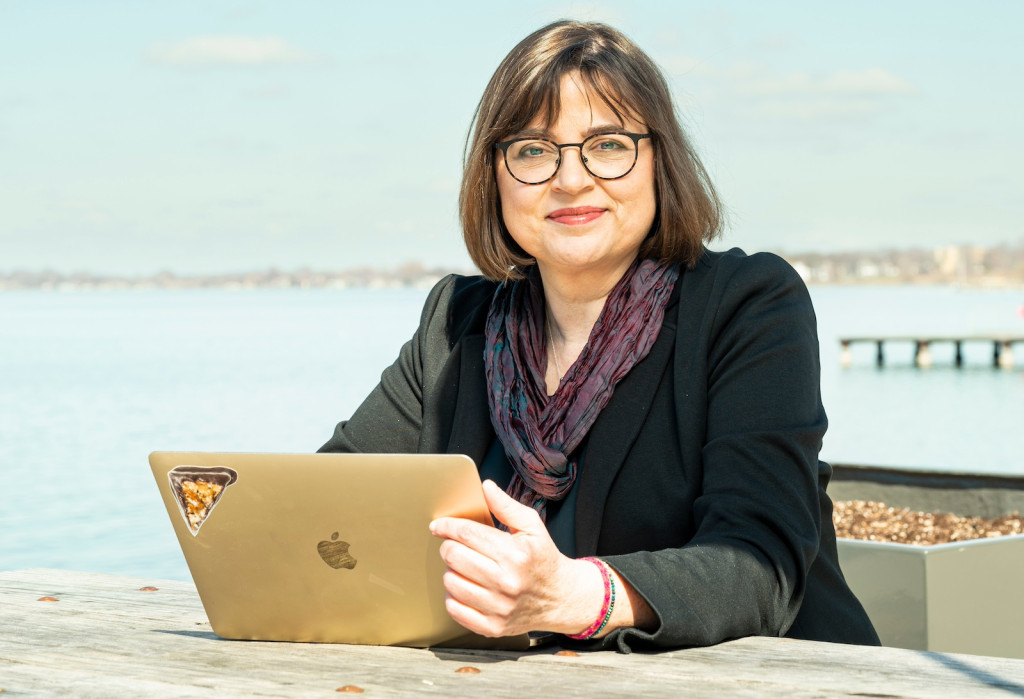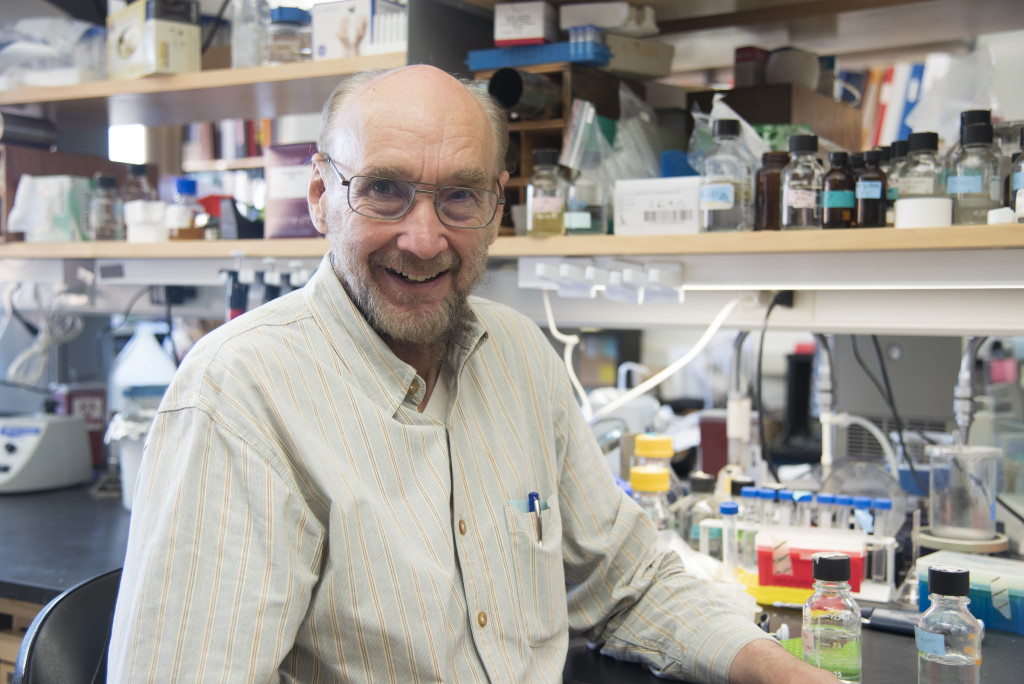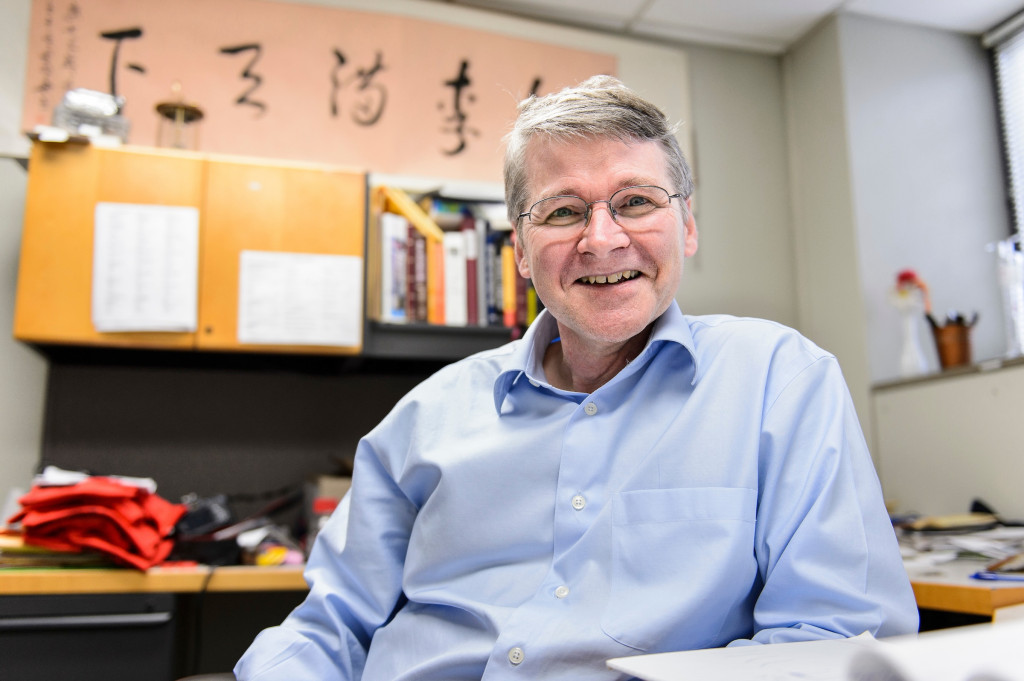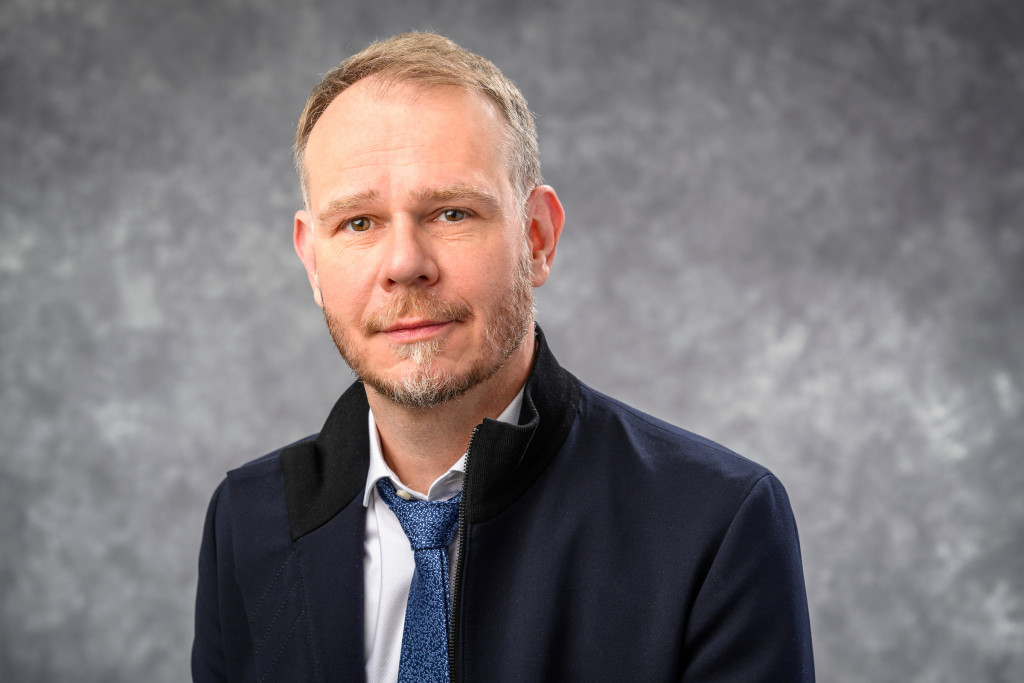Meet the winners of the 2024 Hilldale Awards
Each year, to recognize their contributions to teaching, research and service, the faculty divisions honor four University of Wisconsin–Madison faculty members with the Hilldale Award.
Faculty members representing the arts and humanities, biological sciences, physical sciences and social sciences are selected from nominations submitted by department chairs. The winners will be awarded $7,500 and recognized at the April 1 Faculty Senate meeting.
This year’s Hilldale Award winners are Anja Wanner, Robert Landick, Robert Hamers, and Dietram Scheufele.
Anja Wanner
Enid H. Anderson Professor of English in the College of Letters and Science

Professor Anja Wanner is pictured at the Memorial Union Terrace. Photo: Bryce Richter
Anja Wanner is an expert in English linguistics, particularly the study of syntax. Her work connects theory with application by considering not only the meaning of words but also the way they are structured in a sentence. Her work has grown to focus on grammatical structures that can only be analyzed in context, prompting her to explore conventions in genres and how they have changed over time. She has also collaborated on an analysis of conversations between persons diagnosed with Alzheimer’s Disease and their visitors, offering new insights into appropriate ways of measuring those patients’ linguistic competence.
Though grammar tends to be thought of as a dry and technical subject, Wanner brings enthusiasm, humor and passion to the classroom, whether she is teaching undergraduate or graduate students. She inspires even the most hesitant of students to fall in love with syntax and embraces the use of new technologies to enhance student engagement with and understanding of course materials both in and out of the classroom. Wanner has expanded the benefits of the Writing Center by restructuring departmental programs focused on student writing resources under the unified Center for Teaching and Research on Writing. This has helped focus their goals and outreach efforts to better serve more people across campus, especially historically underserved groups.
She served as the department chair during the early days and height of the COVID-19 pandemic, during which she led the department with optimism, empathy, and clarity. As part of her priority to better serve traditionally underrepresented groups of students, she led a faculty cluster hire that resulted in the hiring of 10 new faculty members, six of whom are faculty of color. She has also served on many shared governance committees such as the Arts & Humanities Divisional Committee, the University Committee, and the Committee for Faculty Rights and Responsibilities.
“She is world-class — an exemplar of what it means to be a faculty member. She is dedicated to colleagues and students, to local projects and campus-wide initiatives, to enduring questions and emerging challenges,” says Christa J. Olson, chair of the Department of English.
Robert Landick
Dr. Laurens Anderson Distinguished Professor of Biochemistry in the College of Agricultural and Life Sciences

Professor Robert Landick is pictured in the laboratory.
Robert Landick’s work focuses on the biochemical processes behind the form and function of DNA and RNA, the molecules that govern all of biology. He has made several landmark discoveries in molecular biology, providing insight into the role of enzyme RNA polymerase and the mechanisms that enable transcription of DNA and generation of proteins. His observations have laid the groundwork for the field of single-molecule biochemistry, illuminated connections between biochemistry and genomics, provided potential treatments of diseases, and even developed methods to engineer biofuels and bioproducts from renewable resources. He has been elected to the American Academy of Arts and Sciences and the American Association for the Advancement of Science, and is a Fellow of the American Academy of Microbiology.
Through teaching and mentoring undergraduates and graduate students alike, Landick has worked tirelessly to improve training for students on campus and impart crucial grant-writing and communication skills. As a founding director of the Microbiology Doctoral Training Program, he has led campus and national efforts to diversify doctoral trainees. His individualized approach to mentorship of undergraduates has resulted in their earning authorship and sometimes even first authorship of papers as well as admittance to top graduate programs.
Landick played a pivotal role in launching the Great Lakes Bioenergy Research Center, which has become a keystone national research center working to enable sustainable energy independence. He was also instrumental in establishing UW–Madison as an international center for cryogenic electron microscopy, a technique which allows scientists to gain structural information on biological systems from imaging through the use of high-speed electrons.
“Landick has made a continuing stream of seminal research contributions that place him among the most elite faculty on campus,” said Brian Fox, chair of the Department of Biochemistry. “His exceptional vision and leadership have strengthened our campus immeasurably. We view Landick’s service as a treasured asset of the University and the State of Wisconsin.”
Robert Hamers
Steenbock Professor of Physical Sciences in the Department of Chemistry in the College of Letters and Science

Professor Robert Hamers is pictured in his office in the Chemistry Building. Photo: Jeff Miller
In his time at the university, Robert Hamers has furthered his foundational work in surface chemistry and nanotechnology. His early work helped him create a powerful microscope that allowed scientists to capture atomic images to observe chemical bonds and the structures of various surfaces. His ability to work with chemically complex systems led him to take experimental approaches that expanded researchers’ understanding of chemical reactivity. This work laid the foundation for the field of surface chemistry and later led to Hamer’s becoming a pioneer in nanotechnology.
Hamers teaches graduate courses and all of the department’s undergraduate courses in analytical chemistry. By introducing research-based experiments to undergraduate laboratories, Hamers provides experiences that combine chemistry with societal impacts so students can see how chemistry applies to real-world problems. He has created multiple programs that give undergraduates hands-on research opportunities.
In 2012, Hamers founded the National Science Foundation Center for Sustainable Nanotechnology and has since served as its director, facilitating collaboration across 10 other universities and two government labs in an integrated effort to understand the fundamental chemistry associated with nanoparticle interaction with living systems in the environment. He also oversees a blog site that aims to inform the public and train students in communicating science to a lay audience.
Hamers has served as chair of his department and played an integral role in advocating for the new and recently opened chemistry building. Hamers also cofounded Silatronix, Inc. to bring fundamental chemistry research to the market as technologies.
“Robert is the most successful person I have known,” said John C. Wright, a professor emeritus of chemistry at UW–Madison. “He is totally dedicated to science, teaching, the university, family, and the betterment of mankind. His work ethic, insights, creativity, energy and thoughtfulness are the key factors responsible for his success.”
Dietram Scheufele
Taylor-Bascom Chair in Science Communication and Vilas Distinguished Achievement Professor in Life Sciences Communication in the College of Agricultural and Life Sciences

Professor Dietram Scheufele is pictured. Photo: Althea Dotzour
Dietram Scheufele is one of the leading scholars examining the social effects of emerging science and technology while developing effective strategies for communicating and engaging a variety of audiences with science. He has pioneered new approaches to investigate questions about fake news, misinformation, incivility in online debates and creating an informed citizenry. He is one of the most widely cited political, science, and misinformation communications experts in the world, helping to lay the foundation for the discipline of science communication. Scheufele has also kept the urgent need for science to connect with audiences that it has traditionally ignored or not served well at the forefront of all his research, teaching and service endeavors.
In 2022, he was recognized for his excellence in teaching with the Chancellor’s Distinguished Teaching Award. He has taught thousands of undergraduate and graduate students, serving as the primary advisor for almost 50 master’s and doctoral students. For almost 20 years, Scheufele has committed to integrating cutting-edge teaching methods and technologies that will increase student flexibility and enhance deeper learning and student engagement into the courses he teaches. He has established innovative programs that serve students across campus, creating pathways for bench scientists and students from various degrees to also train in science communication.
His service has benefited the department, university, and profession of science communication as a whole. In his time as the director of Academic Programs for Life Science Communications, he created the PhD minor and graduate certificate programs, which expanded access to science communication research and practice for students across the university. He served on the College of Agricultural and Life Sciences’ Equity and Diversity Committee for the most prestigious academic journals in his fields, and has been a member of countless committees for the National Academies of Sciences, Engineering & Medicine.
Tags: faculty awards




